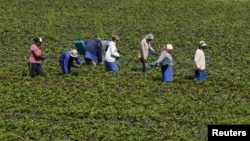Solidarity Center and other migrant labor organizations are calling on the South African government to urgently intervene and stop severe labor rights abuses faced by thousands of migrants working in the country’s farms. Thousands of Zimbabweans who fled economic meltdown in their country are being mistreated on farms in northern South Africa.
Zimbabwean national Thembani Ndlovu has been working at the Johannesburg Farm in the northern province of Limpopo for eight years. He describes his employment at the farm as a job from hell.
He works seven days a week for 18 hours a day, but is earning only $120 per month. This is 50 percent below the stipulated $240 per month for farm workers.
He and other Zimbabweans are temporarily housed at a disaster management center in Limpopo, after they were brutally assaulted by their employer with the help of fellow farm owners for demanding an extra $0.59 a day for the extra hours they are working.
Ndlovu says on the day they were evicted from the farm, their employer teamed up with neighboring farmers and unleashed dogs, teargas and rubber bullets on them. He angrily says that even animals deserve better sympathy than they got from their employer.
“All of us, we are human beings. We are Africans. They must not treat us as if we are animals. Even the white people they are supposed to be told we are human beings and we need equal rights.” Ndlovu said.
No enforcement
Solidarity Center Country Programs Director Peter Hardie wants the government to urgently put a stop to the abuse. He calls for South Africa's Department of Labor to do more in protecting undocumented migrants and to ensure that farm owners pay the wages stipulated by the law.
“The laws are there. The biggest challenge around most of this is just inability to enforce what exist on the books,” said Hardie.
Janet Munakamwe from African Diaspora Workers Network says migrant organizations want the government to deal harshly with the Johannesburg Farm owner, as a deterrent to abuse.
“The socio-economic rights of workers being trampled on, treated under very slave-like conditions. The employer actually confiscates the documentation to limit mobility. We are not going to allow this farmer to get away with it this time, such that we deter these particular commercial farmers from whatever they have been doing,” Munakamwe said.
South Africa has been the first choice of thousands of African migrants fleeing war and economic difficulties in their home countries.
Rights organizations say even more migrants could be coming, due to the drought and worsening economic conditions in many African countries.





